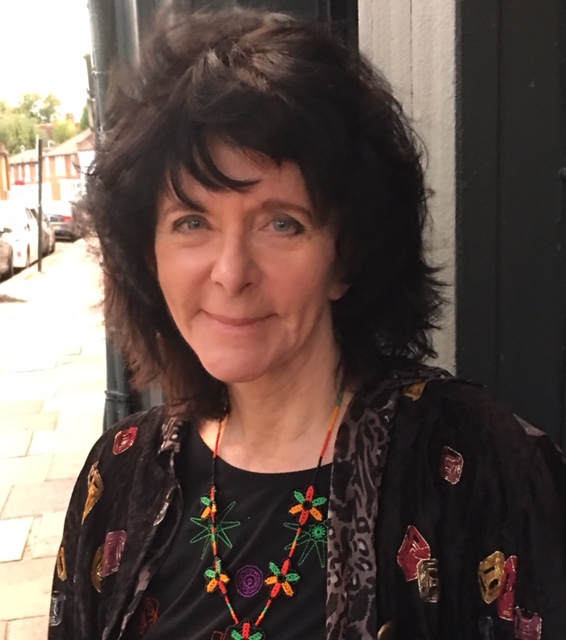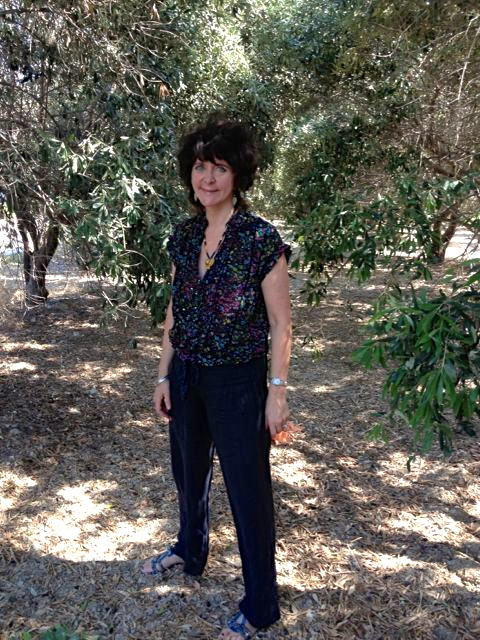
Ruth Padel
“Exploring the Jungle of Life,” Hampstead & Highgate Express, March 2010
Padel Explores the Jungle of Life
Inspired by her interest in wildlife and conservation, the Hampstead poet has written a novel which parallels the human world with the animal one, discovers Bridget Galton
Ruth Padel is that rare beast – a high profile poet. She has been Chair of the Poetry Society and has invented a new writing form, last year’s much-lauded verse biography of her great great grandfather Charles Darwin and even been invited onto Radio 4’s Desert Island Discs.
For nine days last year she was the first female Professor of Poetry at Oxfor Unviersuty, before she resigned over claims of a smear campaign against rival DerekWalcott.
As the media warmed to the theme of bitchiness in the groves of academe, Padel stepped down–not because the claims were true, but because the row threatened to overshadow her life and work.
When we meet in her local Starbucks in South End Green, Padel sighs that poets only hit the headlines when they win a prize or get embroiled in scandal.
“I remember in 1990, at the first T S Eliot Prize, seeing the row of my friends’ faces before the winner was announced and thinking,‘Thisisawful, this is going to change everything. Prize culture gets media attention but the focus is on the prizes and the poet, not the poems.
“I did my column in The Independent(which resulted in 52Ways Of Looking At A Poem) and the readers really responded to the poems. It makes me rather impatient when the media says that poetry’s elitist and no-one reads it. The number of grassroots poetry festivals now is wonderful and I’ve been judging the National Poetry Competition. I’ve had 11,500 poems s itting in my hall–that’s evidence of enormous interest.”
Padel, who grew up in Broadlands Road, Highgate, threw aside a promising academic career to write full-time in 1985–the same year her daughter Gwen was born.
She describes poetry as “the medium which reflects how people feel and gives us a fresh way of seeing our lives in an encapsulated, memorable form”.
“It’s ‘Everyman I will go with thee and be thy guide’. I write about that in The Poem and the Journey: how poetry can be with us at every stage on the journey of our lives and can help us see our own experience newly or more fully.”
I’m not meeting her to talk about poetry, but her first novel. Where The Serpent Lives (Little Brown, £12.99) is an intricate tale of the people surrounding a dysfunctional marriage in ther un-up to the 7/7bombings. In the hands of a less gifted writer, the woes of frustrated Primrose Hill housewife Rosamund and her philandering, charismatic husband Tyler could have been standard chicklit fare.
But Padel invests the story with rich imagery, psychological insight via multiple narrative viewpoints, and a clever parallel timeline between political and personal events in London and the Indian rainforest.
It took Padel five years to write–including four rewrites– but has clearly been enjoyable because she’s already planning another novel set in Crete.
“It was a real learning curve. I wish I’d known how hard it is to write from four different viewpoints,” she smiles. “Initially, there were too many coincidences, I had to take some out. But each time I rewrote, there was another layer.”
Both Ros’s estranged father and her best friend’s husband are herpetologists – snake experts. Padel was inspired by a renowned herpetologist she met at the Centenary of the Bombay Natural History Society (of which she is a member).
The novel mines a rich seamo f parallels between the animal and human worlds, with characters seen through animal eyes and humans connecting via animals.
“Ros was the hardest character to write because she’s not me. She leads a pretty annoying life where she kept not doing things.
“As soon as I gave her this connection with animals, she made sense,” says Padel, who is also a member of the Zoological Society of London and has previously written a book about protecting Sumatran tigers.
“Doctor Doolittle understands the world in a different way because he can talk to animals and, if you think about it, looking at things in a different way is the beginning of metaphor.
“In the book, animals are a different way of looking at humans. There are people looking at animals and animals looking at humans.”
Padel visited a King Cobra Reserve in the Indian rainforest as part of her research–as well as walking the London locations around Kilburn, Bloomsbury,
Golders Green and Primrose Hill.
“I find it hard to write about things I can’t visualise. In my poems, I am a very visual writer. I describe the colours, the textures of how things look to people.
“The King Cobra Reserve was rather scary. Before going, I had to give my blood type in case I was bitten. But I don’t have a phobia of snakes, I was interested in them because I studied classics and, in Greek myth, they are very important and rich in symbolism. They are messengers between the underworld or portents of doom.”
Beautiful, talented and vivacious in her youth, Ros’s troubled relationship with her father and her mother’s early death led her to seek shelter in the arms of Tyler.
Years later, she has a teenage son who barely communicates with her and a husband out every night with other women, including a beautiful Kosovan singer.
“She’sat this point where the boy doesn’t want her any more. He is growing up and she can see the empty nest to come,” says Padel.
Tyler disrupts the lives of all six characters, yet Padel deliberately never shines a light on his interior world.
“In Virginia Woolf’s The Waves, there is an absent character called Percival who all the other characters are obsessed with. I wanted him to be like that.”
There are several scenes in the Indian jungle where characters are inches from a snake’s deadly venom. The climax juxtaposes one of these scenes with events on 7/7, as seemingly safer Londoners learn they can also be seconds from death.
Padel, who marched against the Iraq war, says she was struck by how Muslim unease and anguish about the warhad been largely ignored in the run-up to 7/7.
“I wanted to write about unawareness, how we live in thi s big multicultural city so unaware of the perceptions of other people who we sit on the bus with.
“The parallel with animals is thatwe can stand in our own garden and be disconnected and unaware o fthe animal life around us.”
Issues of cultural identity, relationships and national politics are interwoven as the novel swerves between city and forest locations.
“Forests seem to me such an example of how life is a tangled banner just like the complexity of a city like London which is full of people from all different places.
I wanted to embed all these big things in the textures of people’s emotional lives where they arereally upset or taken over by the emotions in them.”
Padel, who has also written short stories and factual books, clearly revels in switching between mediums, reflecting that “the mixedness of experience in writing textures mirrors the mixedness of life”.
She never set out to invent the form of a verse biography – her Darwin book sprang from a commission to write about his early childhood.
“I work very much by instinct and, as I discovered more about his life, I wanted to go on and do more,” she says.
“My grandmother was Darwin’s granddaughter and she was very important to me.
“I adored her and loved to visit her interesting house in Buckinghamshire which was filled with complex things. She was really the first Darwin scholar. She edited his autobiography and journal of the Voyage of the Beagle and, in my mind, Darwin is bound up with her.”
